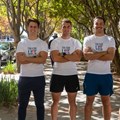South Africa has one of the lowest donation rates globally, with just 1.8 donors per million people, despite its groundbreaking history in organ transplants — including the world’s first successful human-to-human heart transplant at Groote Schuur Hospital.
To remedy the problem, Save7 – a non-profit organisation established and managed by medical students at Stellenbosch University’s Faculty of Medicine and Health Sciences (FMHS) – launched the 'Life Pod', a dedicated specialised support unit for organ donors at the Tygerberg Hospital in Cape Town.
The Life Pod will provide specialised care for consented organ donors, maintaining their organs’ viability during the critical 12- to 36-hour period before transplant surgery. This dedicated space addresses a fundamental bottleneck in South Africa’s transplant system: a shortage of ICU beds that often forces potential donors to be transferred to morgues before their organs can be used to save lives.
Fixing the dwindling organ donation rate

Source: Stellenbosch University. Elmi Muller, Dean: Faculty of Medicine and Health Sciences, Stellenbosch University.
“Transplantation in South Africa is fairly stagnant,” explains Elmi Muller, dean of the FMHS and past president of The Transplant Society. “We have, over the past 10 years, had more or less the same number of donors in the country, particularly deceased donors. Meanwhile, our patients that need transplants have been growing, and the waiting lists have become longer.”
The Life Pod directly tackles this challenge by providing a dedicated space where brain-dead donors can be maintained without competing for scarce Intensive Care Unit (ICU) beds needed by living patients. “Unfortunately, ICU beds are one of the most scarce medical resources in the country," says Jonty Wright, a fifth-year medical student and founder of Save7, the student organisation behind the initiative. “That often means that donors are left by the wayside, and seven people who would have been saved by that donor have to go find somebody else. And they often don’t.”

Image supplied.

Image supplied.
Students leading the way
Founded in 2021 by FMHS medical students, Save7 has evolved from a simple awareness campaign to become the driving force behind South Africa’s first dedicated donor support unit.
“Save7 started with a story,” explains Wright. “Lynette Stuurman, a shopkeeper here at our Maties store was a 30-year-old woman born with a genetic kidney condition. Her sister had died two years previously, awaiting a life-saving kidney transplant that never came. Now she was sitting in the exact same position, quite literally waiting to die.”
The then first-year medical students were touched by the story and decided to take action. “We got together and said we are not going to wait until we get our medical degrees to do something about this,” says Wright. What began as awareness campaigns in lecture halls evolved into a comprehensive approach to addressing systemic barriers in organ transplantation.
The students identified that 60 viable organs were going to waste each week – organs that could save patients. Through mentorship with faculty members, particularly Professor Elmin Steyn, they recognised that the solution required more than awareness, it needed infrastructure.
Bringing the project to life
Raising the R400,000 needed for the Life Pod required innovative fundraising approaches. Wright alongside fellow students – Henri van der Westhuizen, Gerhard Niewoudt, Alexander van Wyk – competed in Ironman 70.3 triathlons as part of their 'Tri for Life' campaign, combining athletic endurance with awareness-raising for organ donation.
The project received crucial support from The Health Foundation, which matched student fundraising efforts, and Tygerberg Hospital administration provided the physical space and operational backing. The students also secured donated equipment, including specialised beds, monitors, ventilators, and essential medical lines.
Sachen Naidu, secretary-general of Save7, describes the Life Pod as “a dedicated donor support room, designed specifically to maintain and nurse a brain-dead donor. It’s kitted out with everything you would expect – from patient monitors to infusion sets to ventilators. We’ve got everything needed to support and take care of a donor.”
Organ donors, once declared brain dead, must be kept on life-sustaining machines for 36 hours. However, beds in hospitals are scarce. That's why the LifePod ICU at Tygerberg Hospital is such a game-changer! #CarteBlanche
[image or embed]
— Carte Blanche (@carteblanche.co.za) May 4, 2025 at 7:48 PM
Moving across the country
Conservative estimates suggest the Life Pod will facilitate one to two donor cases per month, potentially saving over 100 lives annually. Each donor can provide up to seven organs, dramatically expanding the pool of available transplants for South African patients.
“This Life Pod represents a major advancement in our fight to save lives through organ donation,” says Professor André van der Merwe, head of transplant surgery and urology at Tygerberg Hospital. “Witnessing the next generation of medical professionals leading this vital project with such passion and determination is truly inspiring.”
The Life Pod launch represents just the beginning of Save7’s ambitions. The organisation plans to replicate the model in other provinces, with preliminary discussions already underway in Gauteng. Their ultimate goal is creating a national network of specialised donor facilities that can dramatically improve South Africa’s transplant capacity.
“We hope this project will help promote engagement with families at the end of life to counsel them about the possibilities that exist to help others at what is always a time of loss and grief.
"We look forward to seeing how this project can be integrated into the existing health ecosystem, supporting the need for organ and tissue donation,” says Dr David Thomson, chairperson of the Western Cape Provincial Organ and Tissue Donation Committee within the Western Cape Department of Health and Wellness.




































